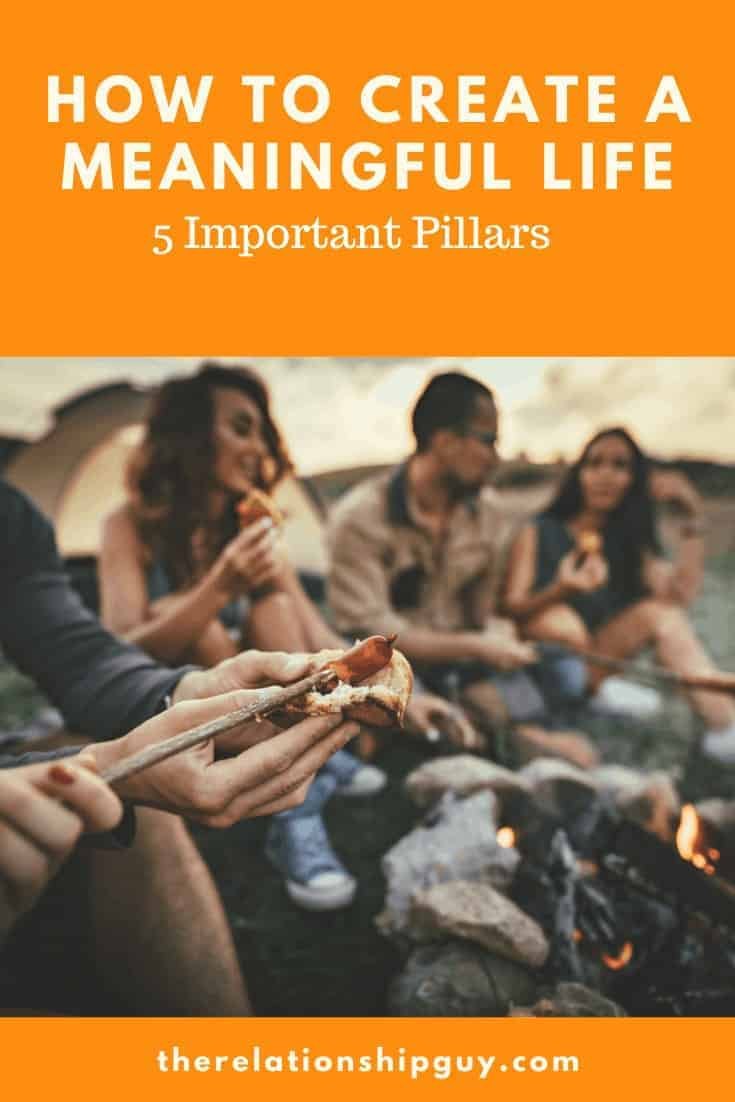What does it take to create a meaningful life? Money? Love? Adventure? Relationships? Charity? Personally, I believe that ultimately, it’s up to you to decide what will give your life meaning. And in this post, we will look at 5 important pillars to consider as you set out to create a meaningful life.

As humans, we have the ability to give anything any meaning.
But the meaning we end up assigning to something determines how we feel which impacts our behavioural reactions.
All of this put together then leads to our experience of life, and whether it’s meaningful or not, filled with happiness or not, and creates fulfilment or not.
We can essentially argue that there’s no inherent meaning to life but you can choose what is meaningful to you.
Or how meaningful something is to you.
This could be scary to some but it’s actually quite freeing as it means that you alone have the power to create a meaningful life.
And that’s where this post comes in.
Even though while creating a meaningful life is an individual decision and mindset, there are a few common starting points to consider.
Pillars, if you will.
But the real individuality comes from how you choose to apply them as a unique person and in your unique situation.
Let’s now look at each pillar one by one.
Consider these crucial aspects of life to create a meaningful life that is fulfilling:
Evolution
It’s a little sad when someone reaches the pinnacle of their life at 35 and coasts to the end.
It’s equally sad when someone turns 65, retires, and believes it’s all over.
They can now sit around at home and wait for the next 25 to 30 years until death comes knocking.
Sad.
To have a meaningful life, it’s important to grow and evolve.
I call it, expanding as a person.
You become more than the “you” yesterday.
If we don’t, a few things might happen …
- regret
- missed opportunities
- missed potential friendships or relationships
- lack of joy
- unhappiness
- becoming stale
- frustration
- feeling as if you’ve wasted your life
- even early death
A Law of the Universe is “Progress” – anything that doesn’t evolve or grow dies.
That’s it.
At some point or another, you’ll wonder what you could have accomplished with a little more time and attention and effort.
So, how would you answer these next few questions?
- How have you changed over the last 10 years?
- What do you know now that you didn’t know then?
- What can you do now that you couldn’t do then?
- What new skills have you developed?
- How has your view of the world changed?
If you haven’t grown as a person in the last year (at least), and don’t confuse regression for growth, then you’re just existing (and exiting) rather than creating a meaningful life.
Ask yourself:
What can I do to start growing in my life again?
Which brings us to the next pillar of creating a meaningful life …
Purpose
Everyone needs a purpose.
The famous Austrian neurologist and psychologist who founded the field of “Logotherapy” through personal experience in the Theresienstadt Nazi concentration camp, once wrote:
Those who have a ‘why’ to live, can bear with almost any ‘how’.
When we lose our purpose, we lose everything.
Oftentimes, ourselves.
We all know of someone that died shortly after retiring because so much of that person’s purpose was locked into their career.
Once the job (purpose) goes, everything seems to go as well.
And this link between purpose and longevity is also supported by research:
A study of nearly 7,000 older Americans found that, over a four-year period, people who felt their lives had meaning were less likely to die than their counterparts who lacked that conviction. “Purposeful living may have health benefits,” a research team led by Aliya Alimujiang of the University of Michigan writes in the journal JAMA Network Open.
Now, the good news is that you can have a purpose without having to go to work for the rest of your life!
In a classic experiment, researchers discovered that when given a plant to care for, elderly nursing home residents lived longer.
Another simple way to create purpose is through volunteering and making a meaningful contribution.
It seems that to live longer, we need to create a meaningful life which comes down to us serving someone or something.
The world-renowned life coach, Tony Robbins, is famous for saying,
The secret to living is giving.
So, the important questions here to ask are:
- What is important to you?
- How can you contribute in a way that you believe is meaningful?
Now, oftentimes, in order to find (new) purpose, we need to expand our tribe (the group we belong to) or join another.
Which brings us to the next pillar of creating a meaningful life …
Belonging to a group
As humans, we ALL want to belong and feel connected.
Conversely, we ALL also fear rejection – the means by which we get excluded.
In fact, we know that much of human behaviour, thought, and emotion stems from our psychological need to belong.
According to Psychology Today, other people matter so much in our lives, they become a source of our self-esteem.
We may even base our self-concepts not only on our unique traits and characteristics (individual self) but also on the attachments we form with significant others (relational self), and the social groups we identify with (collective self).
And it can be a large family, an extensive network of friends, a church, where you work, a club of some sort, or any other type of organization.
We all need to belong to a group and to be accepted by the other members of that group.
It’s wired into our brain and without a sense of belongingness, life becomes less meaningful.
Let me ask you:
- Where is your tribe?
- Do you have one?
- If not, why not?
- What can you do about finding a meaningful tribe?
- How about starting your own tribe?
Without a group, we tend to feel ignored and unappreciated, our self-concept is influenced and our self-esteem can potentially suffer.
In terms of creating a meaningful life, it’s crucial to feel that you belong somewhere.
A meaningful past
Over time, we all develop a past.
That’s part of life, right.
But one of the worst outcomes of a long life is to look back on your past and regret much of it.
Because a past of squandered or passed-up opportunities is sure to make you cringe when you look back on your life.
The top 5 regrets of the Dying are:
- I wish I’d had the courage to live a life true to myself, not the life others expected of me.
I wish I hadn’t worked so hard.
I wish I’d had the courage to express my feelings.
I wish I had stayed in touch with my friends.
I wish that I had let myself be happier.
No matter who you are, at the end of our lives, we all want to have a great story to look back on.
The question I want to you consider are:
- What kind of story will you have?
- What stories do you have to share right now?
- How have you lived in the last 10 years?
- How will you live in the next 10?
Which brings us to Pillar number 5 for creating a meaningful life …
Value experiences and relationships over possessions
Our society is perhaps the most materialistic (and disposable-minded) on Earth.
Ironically, our society also doesn’t rank anywhere near the top for happiness.
We have more abundance in every sense compared to people in earlier eras, but that includes higher levels of mental health issues like anxiety, stress, and depression.
That’s a strong clue that possessions aren’t all that meaningful.
Experiences, however, are!
Research from San Francisco State University found that people who spent money on experiences rather than material items were happier and felt the money was better spent.
That’s because the thrill of purchasing things fades quickly but the joy and memories of experiences, from epic adventures to minute encounters, can last a lifetime.
So, if you’re thinking of creating a meaningful life, you need to consider the following:
- How much enjoyment have you gotten from purchasing something expensive?
- How long did that enjoyment last?
- Did it give your life meaning?
If you want to create a meaningful life, you need to ensure that you’re spending enough time on accumulating experiences and meaningful relationships, rather than stuff.
The Lambo will mean less to you than you think.
The joy of a million dollars will eventually turn to stress as you now need to make sure you keep it.
The hot partner will become just another person that seeks your time and attention like everyone else.
The question is:
- What is meaningful to you?
- How do you need to live in order to believe your life is meaningful?
- And in what ways do you need to grow and contribute to feel that your time on Earth has meaning?
Final Thought …
You can choose what will give your life meaning.
In fact, you are the ONLY one who can choose that.
It’s entirely in your hands.
But it’s important to know and understand that there are certain pillars you can use to create a meaningful life more easily.
You still need to make a conscious choice for yourself, of course, but it’s always wise to learn from those who actually managed to create a meaningful life.

